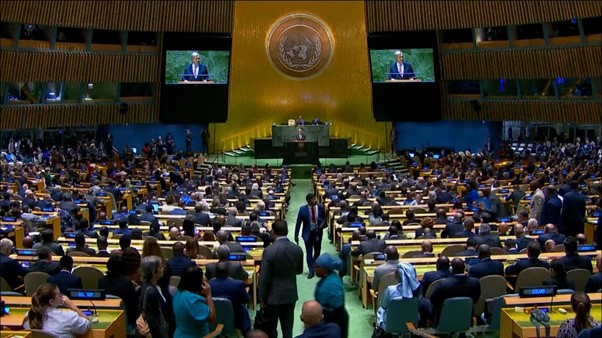
The global scene is burdened with the looming threat of egoistical wars, geopolitical divisions, and environmental crises. Yet, at the dais of the U.N.’s General Assembly, the virtues of cooperation - similar to those the leaders of the modern free world preach about - are always being called upon. This paradox has fueled discontent and skepticism around the United Nations’ ability to uphold the Charter that brought about its existence. How can one be reassured of the effectiveness of a global institution if its same Charter is subject to constant violations by its own member states? Can these constant failures be equated to this institution’s non-existence?
The international political landscape is governed by an anarchical regime where no organizing authority above states regulates and enforces state behavior neither militarily nor economically. This decentralization, albeit the lack of a centralized figure, ensures that states are the main actors in any conflict, while the UN can only assume the role of mediator with its strong diplomats and negotiators. However, this reality puts the UN at risk of being ignored and bypassed by self-interested states that do not stand to gain anything from cooperation, no matter how many coincidental successful attempts at peace were put in place. This has been the sad reality that Neo-realism corroborates.
Nations assume the task of ensuring their own survival. This fundamental task drives the need to establish a strong military force, an astute intelligence agency, and a flawless economy. These pillars reinforce the nation’s capabilities for guaranteeing its survival while enabling the pursuit of other prospects. This modern dilemma pushes states to rely on themselves to accumulate power for their security, an action that stems from paranoia. Therefore, the United Nations becomes irrelevant in upholding peace and security when their attempts clash with the interests of powerful nations, a conflict apparent inside the Security Council (UNSC).
Criticism toward the United Nations has mostly stemmed from the UNSC’s inability to resolve conflict efficiently and accordingly without the mobilization of the veto privilege by the five permanent member-states. This defective security architecture has led to the politicization of the core of the UN, the monopoly on the enforcement of judgments of the International Court of Justice, and the disregard for the pacta sund servanda principle. Hence, unfruitful discussions, a waste of valuable time, and the unjust death of civilians have taken place from this deadlock.
The UN suffers from geopolitical tensions and rising competing interests. However, its complete dismissal is shortsighted. The United Nations is an Agora, which Hegel dreamt of. It is the only multilateral forum where the 193 nations of this world exchange thoughts, where the most marginalized nations get an even playing field with the most powerful, and where each nation has a voice. It is a successful norm-setter that guides states to sustainable development. It is, through its various agencies and aid programs, a reliable institution for those in need while still being slow, bureaucratic, and mismanaged, judging from the recent FAO criticism. Moreover, it has proven to be a place of promising reforms with the implementation of the Liechtenstein Veto Initiative in 2022, which ensures that those responsible for blocking progress in a critical global problem - through using the veto - are held accountable in the General Assembly.
Nonetheless, the United Nations is damaged. The institutional structures, backbone of global cooperation, are outdated and inefficient in tackling the current political landscape. Its Security Council has been woefully weak. And its financial influence and ability to sustain humanitarian efforts are undermined by unpredictable payments and cowardice. Reforming this organization is now more important than ever, and as the UN Secretary-General Guterres stated, “It is reform or rupture. The world has changed. Our institutions have not.” This choice is a real one. And the ghosts of the League of Nations parade in New York.